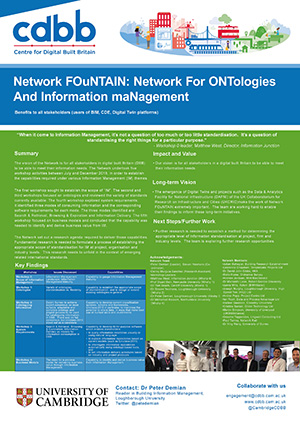The Network FOuNTAIN’s vision is for all stakeholders in Digital Built Britain (DBB) to be able to meet their information needs. With the establishment of concepts such as Building Information Modelling (BIM) and Common Data Environments (CDE), built environment design, construction and operation are becoming increasingly information-intensive.
Peter Demian, Loughborough University
'Network FOuNTAIN: Network For ONTologies And Information maNagement in Digital Built Britain'
 [FINAL REPORT] - https://doi.org/10.17863/CAM.40456
[FINAL REPORT] - https://doi.org/10.17863/CAM.40456
For stakeholders to meet their information needs is increasingly like finding the proverbial “needle in a haystack”. That can be even more challenging if one is unaware that one is looking for a needle, one is unfamiliar with how the haystack is structured or it is not structured at all!
The Network will simultaneously consider the following three dimensions:
(1) the lifecycle of information, from its creation, delivery, capture, preservation, management, automation, retrieval, and reuse;
(2) the whole and extended asset lifecycle from concept design, through operation, to service delivery and use;
(3) increasing asset scale ranging from a single asset to an entire neighbourhood or city.
The Network will adopt a user-centred approach, placing the user of information at the centre, and considering multiple modes of interacting with information, from search and retrieval to browsing and exploration.
Members of Network FOuNTAIN will hold workshops to:
(1) Scope out the issue of information management in Digital Built Britain;
(2) Explore ontologies to extract information from data;
(3) Catalogue the types of information to be managed in Digital Built Britain;
(4) Specify software requirements for tools to manage this information (whether searching, browsing or having information “pushed” to the user);
(5) formulate business models to operationalise these information management tools and processes.
As information management is a pervasive issue, the network hopes to interact closely with the other networks of the CDBB. The proposing team comprises academics, practitioners and policy stakeholders; we welcome interest and engagement from the wider community and look forward to seeking you at our workshops.
November 2018 Update:
The CDBB Network FOuNTAIN, now in its fourth month, is now well established and with an expanding membership having double in size to 40 Members opting in to receive communications and participate in various activities. In the first of four planned workshops, Matthew West of Information Junction, provided an introduction to the theme of Network FOuNTAIN: “Managing Information in a Digital Built Britain”, which was followed by a discussion of the status of the industry’s information management maturity, and a mapping of participants’ research activities to the Information Management Landscape.
A subsequent workshop led by Professor Stuart Barr of Newcastle University and Dr Tom Beach from Cardiff University, provided an “Ontology Tutorial”, with several participants then presenting case studies of how ontologies are used in their professional practice. The day concluded with an exploration of current industrial and academic use of ontologies, gaps in the state-of-the-art and opportunities for future development.
In a third and most recent workshop, Dr Peter Demian of Loughborough University, reviewed the possible ways in which users can interact with built environment information repositories (retrieval, exploration, information delivery), before facilitating discussions on to propose useful human-computer interaction designs (or software system requirements) which can inform search functionality in future generations of Common Data Environments, digital platforms and sociotechnical systems.
In the same week, Dr Steven Yeomans also from Loughborough University, lead an activity to engage a panel of expert practitioners from within the Network to review current ontologies/standards, and how they categorise information. Through use of the Delphi method, the aim is to obtain expert opinion and build consensus on shaping the future ontologies for a DBB.
A fourth and final workshop will be held in Northumbria University on 30 November, where Dr Mohamad Kassem will aim to place the information management tools and concepts from earlier workshops in the context of existing (and new, if necessary) project and organisational processes.
December 2018 Update
The CDBB Network FOuNTAIN (Network For ONTologies And iNformation maNagement) have had their fifth and final workshop on 30 November in the Loughborough University London campus. After previous workshops reviewing the scope of information management, the role of ontologies, the types of information to be managed and the information management software functionality needed, the final workshop put information management in the context of business and project processes. Dr. Mohamad Kassem from Northumbria University led a lively discussion of business process models and made a case for a value-driven ontology for business models under Digital Built Britain. The group concluded that a process model was needed for delivering business value through information management.

From left to right:Professor Joseph Tah, Oxford Brookes University; Mohamad Kassem, Northumbria University; Dr Marianthi Leon, Robert Gordon University; Mohammad Saki, University of Greenwich; Graeme Tappenden, Lingwell Consulting; Dr Peter Demian, Loughborough University;Martin Simpson, University of Liverpool / UKBIMAlliance;Lawrence Chapman, TempleGate Projects Ltd;Jamie Mills, BIM4Water; Matthew West, Information Junction; Danny Murguia, Loughborough University; Inserted: Andrew Jordaan, Mott MacDonald (attended via remote login)
To find out more about Network FOuNTAIN, get involved or request further information, please contact Dr Peter Demain orDr Steven Yeomans

